For the first 42 years of her/his life, Hiker Chiu (丘愛芝) didn’t know who she or he was. Born and raised a girl, Chiu liked to play with dolls and dreamed of getting married and having babies. Then at the age of 10, her body stopped growing. While other girls reached puberty, Chiu waited for her first period, which never came. And her breasts didn’t develop as her classmates.
“My world collapsed. I was living in fear, not knowing what I would become,” Chiu says.
Being a person whose body doesn’t easily fit in with what is considered standard for female or male, Chiu felt alone. The unexplained scar on her/his belly only deepened a sense of secrecy and shame.
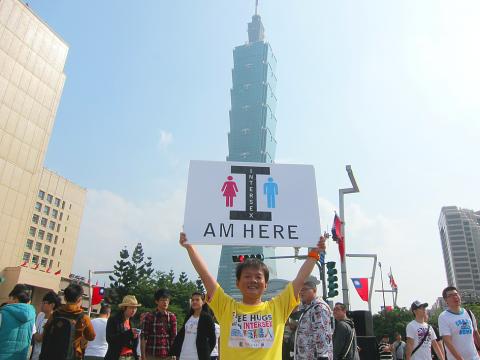
Photo courtesy of Yeh Hsiao-chi
It wasn’t until decades later when s/he came across XXY, an Argentinian movie about a 15-year-old intersex person, in 2008 that Chiu began to understand who s/he really is. In 2010, Chiu made the debut public appearance as an intersex person at the LGBT Pride Parade in Taipei, becoming the country’s first and so far only openly intersex advocate.
“It started out simply: I want to find others like me,” the 47-year-old Chiu says.
GENETIC VARIATIONS
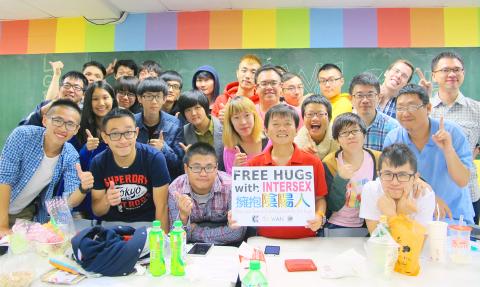
Photo courtesy of Yeh Hsiao-chi
Intersex is a term used to describe people whose biological sex is ambiguous. There are a range of variations in sexual characteristics including chromosomes, gonads, genitals and internal reproductive organs that don’t allow an individual to be clearly identified as male or female. For example, if a person with male chromosomes does not respond to androgens in the usual way, the result is a feminine appearance ranging from ambiguous genitalia to the development of breasts, vagina and clitoris.
Chiu, on the other hand, is a genetic female whose body produces high level of androgens, resulting in an enlarged clitoris and absence of puberty. The various degrees of intersexuality are not medical conditions but parts of the natural continuum of anatomical and genetic variations, says Chiu.
“The LGBT movement has taught us that gender is a spectrum. What people don’t realize is that sex is also a spectrum, and each one of us is a variation in between the two ends,” s/he explains.
In reality, however, our society operates on the principle that there were only two sex categories – male and female – and nothing in between. Intersex infants are assigned a sex at birth, and surgical operations may follow in order to conform their physical sex characteristics to that assignment. When s/he was a six-year-old, Chiu’s clitoris was surgically reduced to a “proper” size. Growing up, Chiu had a vague memory of her lying on an operating table, but the procedure was never mentioned again in Chiu’s household.
“When I was little, I could sense my parents’ feeling of guilt toward me without knowing why. I thought there must be something wrong with me to make them feel that way. I felt something was hidden, and it was shameful and should be silenced,” Chiu says.
ANATOMICAL SELF-DETERMINATION
Many intersex individuals, however, are not aware that they are intersex as their genital variations were “corrected” through “normalizing” surgeries typically performed at birth. Chiu says the practice was introduced to the US in the early 1950s and soon spread to Taiwan, where the first intersex person was discovered and “cured” in 1953.
Over the years, the advent of intersex activism, which started in the US in the early 1990s, has expanded the knowledge about intersex people. Yet, in the eyes of intersex activists like Chiu, progress has been too slow to put an end to surgery without consent of the intersex person. Intersex advocates and experts have long criticised the necessity of early interventions, urging surgery on an intersex individual should wait until that person can make an informed decision so as to ensure the right of bodily integrity and self-determination.
Chiu gives an example of one of his/her American friends, who was born a baby boy with a micro-penis. The doctor decided to remove the atypical genitalia and made him into a girl. But the friend never felt right about himself until he found out about his intersexuality later in life.
“He began the transition to become the male he was born to be when he was 29 years old. For years, he has gradually put his life back together. It has been a long, painful process,” Chiu says.
“It is believed that as long as a baby is raised as a certain gender, he or she will live up to that gender. But it is not that simple. Otherwise, there won’t be any transgender people.”
“We want to keep our whole, complete bodies so we can decide what to do because we are the ones who have to live with our bodies. Not doctors, not anyone else… Isn’t it a basic right that should be enjoyed by all human beings?” s/he adds.
WHO AM I?
Chiu says the notion and expression of gender are never natural and self-explanatory. For most of her/his life, Chiu felt split, unable to completely fit into the world of either girls/women nor boys/men. Now in her/his late 40s, Chiu retains a physical appearance of a teenage boy.
“To me, having a unisex look is the safest choice. Putting on dresses in accordance to the sex category indicated on my ID card has always been one of my biggest fears. I will look like a man in women’s cloth, and that is ridiculed and condemned by society,” Chiu explains.
The intersex advocate says that s/he wasn’t harassed too much growing up, but most people have a hard time knowing how to act toward her/him. Confusion often arises when people don’t know whether to call Chiu “mister” or “miss,” and having her/his passport checked at the airport is always an awkward matter. Moreover, as society doesn’t recognize the needs of those who go beyond the sexual binary, Chiu is sometimes asked to leave when trying to use the women’s restroom.
“The need to fit into a certain box is a source of anguish… Are we a mistake just because we don’t look standard enough?” Chiu asks.
Gender-wise, people born with atypical sex anatomies grow up to have different kinds of gender identities. Some identify themselves as exclusively female or male; some have experiences of gender other than the two categories. And when it comes to sexual orientation, intersex individuals, like the non-intersex majority, may be straight, lesbian, gay or bisexual.
Chiu, in particular, has a double-queer view on love, identifying her/himself as a gay person attracted to both men and women. In other words, Chiu thinks of her/himself as a gay man when in a relationship with a male, and a lesbian when with a woman.
In her/his 10-year relationship with a gay woman who is a “tomboy” (a term often used by the lesbian community to refer to a woman with strong masculine characteristics) but whose physical appearance is more feminine than hers/his, Chiu was expected to be gentle and womanly, while her/his partner took up the traditional male role of a protector and caretaker.
“It was a weird feeling for me, as if I was going through a transition to become a female, which I genetically am. But it literally took me a year to make that mental transition,” Chiu says.
They eventually broke up, and one of the reasons his/her partner gave Chiu was that s/he was “too much like a man.”
“It made me feel that I had an unqualified body and that I couldn’t be a gay woman because I wasn’t really a woman. When I found the lesbian community, I thought ‘finally, here is a place for me in the world.’ But then I felt nowhere to go again,” Chiu says.
SELF-DISCOVERY
Then s/he saw the movie in 2008, which led her/him to the Organization Intersex International (OII), a global advocacy group for people with intersex variations.
“I knew right away that I had finally found what I had been searching for,” the activist says. In the same year, Chiu quietly set up the Organization Intersex International — Chinese (OII-Chinese, 國際陰陽人組織 — 中文版). By using the derogatory, archaic Chinese term Yinyangren (陰陽人, literally: hermaphrodite) for the intersex people, Chiu hopes to draw attention to and reverse the negative association with being abnormal and a shame to one’s family, and highlight the sense of fluidity connoted in the idea of yin and yang that transcends the male-female binary.
“We are traditionally known as yinyangren, and we have suffered as a result of that labeling. So how do we recognize our own kind if we call ourselves another name?” says Chiu, who is currently a doctoral candidate at Shu-te University’s Graduate school of Human Sexuality.
In 2010, Chiu visited several intersex advocates while in the US, including OII founder Curtis Hinkle and Hida Viloria, director of the OII-USA. It turned out to be an empowering experience. Upon returning to Taiwan, Chiu decided it was time for her/him to go public and launched the ongoing Free Hugs campaign at the LGBT Pride Parade in Taipei to make the non-intersex majority open their mind and eyes to the existence of intersex people, in an effort to raise awareness and promote acceptance.
“To us, to love and be loved doesn’t come easily. People think we are abnormal; we are kept hidden by our parents,” Chiu says.
“Many of us are afraid to get into a relationship because we are afraid to show our bodies, to be seen as freaks.”
REACHING OUT
In Taiwan, Chiu’s coming out in the public eye in 2010 marks the beginning of the country’s intersex movement. So far, less than 10 intersex individuals have joined her/his organization, and Chiu’s campaign remains largely a one-person operation. It comes as little surprise to the activist since intersex individuals probably have little understanding of their intersexuality or are reluctant to be labeled as intersex in an unaccepting society.
Nevertheless, Chiu has continued to hold lectures, talks and other events across the country in the hope of increasing the knowledge about the human rights and social situations of intersex people.
Wang Hsiu-yun (王秀雲), an associate professor at National Cheng Kung University’s Department of Medicine, echoes Chiu’s sentiment, stressing that facilitating understanding is the first step in eliminating harmful assumptions and biases.
“Intersexuality needs to be articulated. As long as it remains hidden, we don’t know how to address it. Neither can we tackle the problems because we don’t even know what they are and where to begin,” says Wang, whose academic studies focus on gender and medicine.
As the only Asian representative to attend the international intersex forum organized annually by the International Lesbian, Gay, Bisexual, Trans and Intersex Association (ILGA), one of the world’s biggest LGBTI organizations, Chiu has attempted to reach out to people like her/himself in Asian, countries including Hong Kong, Thailand, Malaysia and the Philippines, through online communities. S/he has also set up a private online group in China, off-limit to non-intersex people since the stigma and discrimination intersex individuals face are much severer there than in Taiwan.
To the advocate, visibility is essential if intersex individuals are to stop living in isolation.
“We are just beginning to understand who we are. If we don’t find others, don’t know how others live, how are we going to have our own stories, our own voices,” Chiu says.
“The Taiwanese society is relatively friendly, and we have a relatively strong LGBT movement…. I feel I am ready to share my experiences with others, to seek out and look after my people.”
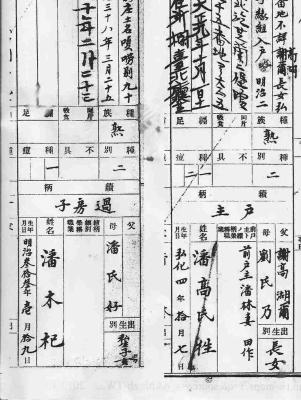
Feb. 9 to Feb.15 Growing up in the 1980s, Pan Wen-li (潘文立) was repeatedly told in elementary school that his family could not have originated in Taipei. At the time, there was a lack of understanding of Pingpu (plains Indigenous) peoples, who had mostly assimilated to Han-Taiwanese society and had no official recognition. Students were required to list their ancestral homes then, and when Pan wrote “Taipei,” his teacher rejected it as impossible. His father, an elder of the Ketagalan-founded Independence Presbyterian Church in Xinbeitou (自立長老會新北投教會), insisted that their family had always lived in the area. But under postwar
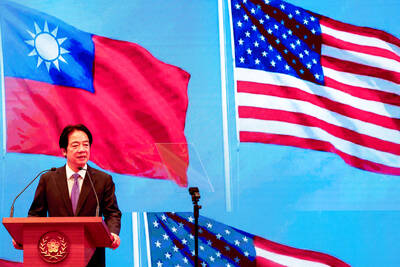
In 2012, the US Department of Justice (DOJ) heroically seized residences belonging to the family of former president Chen Shui-bian (陳水扁), “purchased with the proceeds of alleged bribes,” the DOJ announcement said. “Alleged” was enough. Strangely, the DOJ remains unmoved by the any of the extensive illegality of the two Leninist authoritarian parties that held power in the People’s Republic of China (PRC) and Taiwan. If only Chen had run a one-party state that imprisoned, tortured and murdered its opponents, his property would have been completely safe from DOJ action. I must also note two things in the interests of completeness.
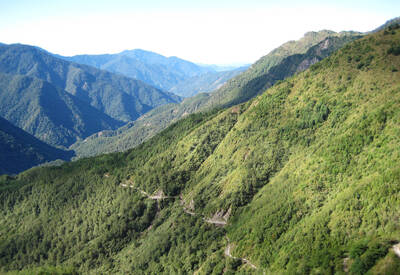
Taiwan is especially vulnerable to climate change. The surrounding seas are rising at twice the global rate, extreme heat is becoming a serious problem in the country’s cities, and typhoons are growing less frequent (resulting in droughts) but more destructive. Yet young Taiwanese, according to interviewees who often discuss such issues with this demographic, seldom show signs of climate anxiety, despite their teachers being convinced that humanity has a great deal to worry about. Climate anxiety or eco-anxiety isn’t a psychological disorder recognized by diagnostic manuals, but that doesn’t make it any less real to those who have a chronic and
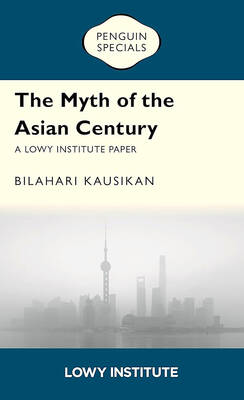
When Bilahari Kausikan defines Singapore as a small country “whose ability to influence events outside its borders is always limited but never completely non-existent,” we wish we could say the same about Taiwan. In a little book called The Myth of the Asian Century, he demolishes a number of preconceived ideas that shackle Taiwan’s self-confidence in its own agency. Kausikan worked for almost 40 years at Singapore’s Ministry of Foreign Affairs, reaching the position of permanent secretary: saying that he knows what he is talking about is an understatement. He was in charge of foreign affairs in a pivotal place in